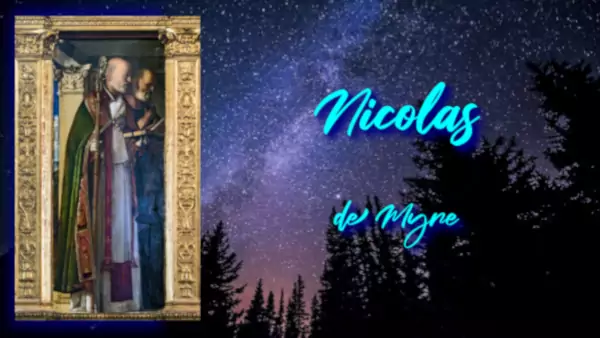06 décembre — Saint Nicolas est né à Patare, en Lycie en 270. Ses parents étaient connus pour leur piété et ils ont eu Nicolas en implorant Dieu parce qu'ils ne pouvaient enfanter. Dieu finit par accéder à leur demande si insistante.
As a child, Nicolas was already astonished by his behavior, because instead of suckling several times a day, there were two days in the week when he took the breast only once, and only at night. Some documents say that these days are Friday and Saturday, while others say, Friday and Wednesday; it doesn't matter which day, but what is certain is that it happens two days in the week. While he was still growing up, an outbreak of plague took his parents away. Nicolas loved to help his friends and he gave his possessions to the poor. His uncle, a bishop, appreciated his piety so much that he ordained him a priest when Nicholas was old enough, thus fulfilling the prophecy: "He will be the consolation of the afflicted, the savior of tormented souls, the shepherd who will bring the lost sheep back to the fold of Jesus Christ". He dedicated his whole life to God. He went to Palestine to honor the Holy Land. Back in his homeland, he set an example of holiness and God prepared him to go to Myra, in the province of Lycia. This diocese had just lost its bishop, and all the bishops had met to decide who would succeed him. They learned through foreboding during this meeting that the first person to enter the church, named Nicholas, would be elected bishop. And it happened exactly like that. Nicholas was ordained bishop and everyone was pleased with him. His life reflected purity, piety, fasting, liberation and charity.
One of his deeds was to save the dignity of the three daughters whose father had almost sent them into prostitution because he did not have the dowry for the marriage of his daughters. Nicholas gave them the money, so in the evening he put three bursaries in the window, there was money to help the three girls, so they could have a dignified marriage. After his pilgrimage to the Holy Land, Nicholas also rescued the sailors, knowing that there would be a storm, he warned the sailors. When the bad weather occurred, Nicholas calmed him down with prayer, and that is why the sailors chose him as their patron saint.
Nicholas continued to help widows and orphans, encouraging those who were in distress. This was the case of three men condemned by Emperor Constantine. Despite the distance, Nicholas appeared to the emperor during his lifetime, reprimanded him and demanded the release of the three men. Nicholas announced the truth of the Christian faith in his diocese, but Diocletian and Emperor Maximian ordered his arrest and imprisonment, but did not dare to attempt to take his life for fear of the people. Emperor Constantine ordered his release and Nicholas returned to Myra, and took part in the first Council of Nicaea in 325 with the 318 Fathers of the Council, who condemned the heresy of Arianism. He then returned to his diocese at the end of this council, and realizing that his time was approaching on December 6, 350, he said: "Lord, I place my soul in your hands". Upon his death, his body was taken to a Benedictine church in Bari, where many of the faithful had venerated him since 1087. Note that the representation of St. Nicholas is the image of a bishop with three purses on a book with three children and an anchor.








